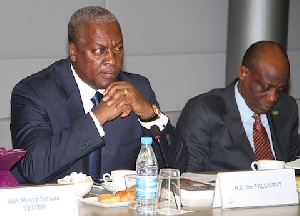…as FATCA comes into force in July
Government is to broaden the current tax net to include Ghanaians engaged in economic activities or hold investments in the United States, Dr. Larbi Siaw, Tax Policy Adviser at the Ministry of Finance (MOFEP) has said
Dr. Larbi said that implementation of the Foreign Account Tax Compliance Act of the United States Internal Revenue Service (US-IRS) presents an opportunity for government to broaden the tax net.
The FATCA, which comes into force in July, is a U.S statute that requires American citizens living outside the United States to report their financial accounts held outside the US.
“It is a factor we are working on, and it will give us basis for future collaboration and future foreign relations. Now we are giving information about US nationals who have accounts and are doing business in Ghana; but in future, when the protocol is extended, we can extend it to Ghanaian nationals overseas,” Dr. Larbi told the B&FT
To extend the tax base to cover Ghanaians abroad will require an amendment to the country’s tax law that limits taxation to citizens who work in Ghana or bring money into the country.
“US laws say all nationals anywhere, but Ghanaian laws say if you work here and then bring money here, the jurisdictions are different. We have attempted before to extend the tax base to cover Ghanaians everywhere, but we certainly will have to take a second look at it,” Dr. Larbi said.
The statute requires local financial institutions to first register with the US-IRS and thereafter identify, document and report accounts owned by American citizens to the United States Internal Revenue Service for tax purposes.
It attempts to combat US tax evasion by requiring that non-US financial institutions report the identities of US shareholders or customers.
Under the FATCA statute, local financial institutions that do not comply will be subjected to a 30% withholding tax on income and proceeds from their investments in the US. Non-compliance may also make it difficult for local banks to do business with financial institutions that are FATCA-compliant.
US tax authorities have the power to order banks to withhold funds of non-compliant US citizens.
FATCA has expansive information reporting rules aimed at ensuring that US citizens with financial assets outside the US are paying the correct amount of taxes at home.
Financial institutions choosing to comply with FATCA will first need to appoint a FATCA-responsible officer, identify and categorise all customers, and eventually report US persons to the GRA.
In view of the eventual implementation of the FATCA in July, banks in the country have either registered or are finalising their registration with the US-IRS. Banks are also putting the requisite systems in place to smoothen the compliance process.
CAL Bank and its subsidiaries -- CAL Brokers, CAL Nominees and CAL Asset Management -- last week announced that it has duly registered with US-IRS as they qualify as FFIs.
Mr. David Okyere Nyarkoh, Head of Finance, The Royal Bank, told the B&FT: “We have an AML software we are installing to ensure that we are able to identify the nationality of every customer, so we will be able to segregate the US nationals from other nationals. The law applies to the US nationals only.”
Banks in the country have decided on a model that will allow them to report through the Ghana Revenue Authority (GRA) once a year.
The Bank of Ghana is expected to introduce new account-opening forms that will capture the appropriate data of US clients of banks in the country.
Business News of Wednesday, 28 May 2014
Source: B&FT

















